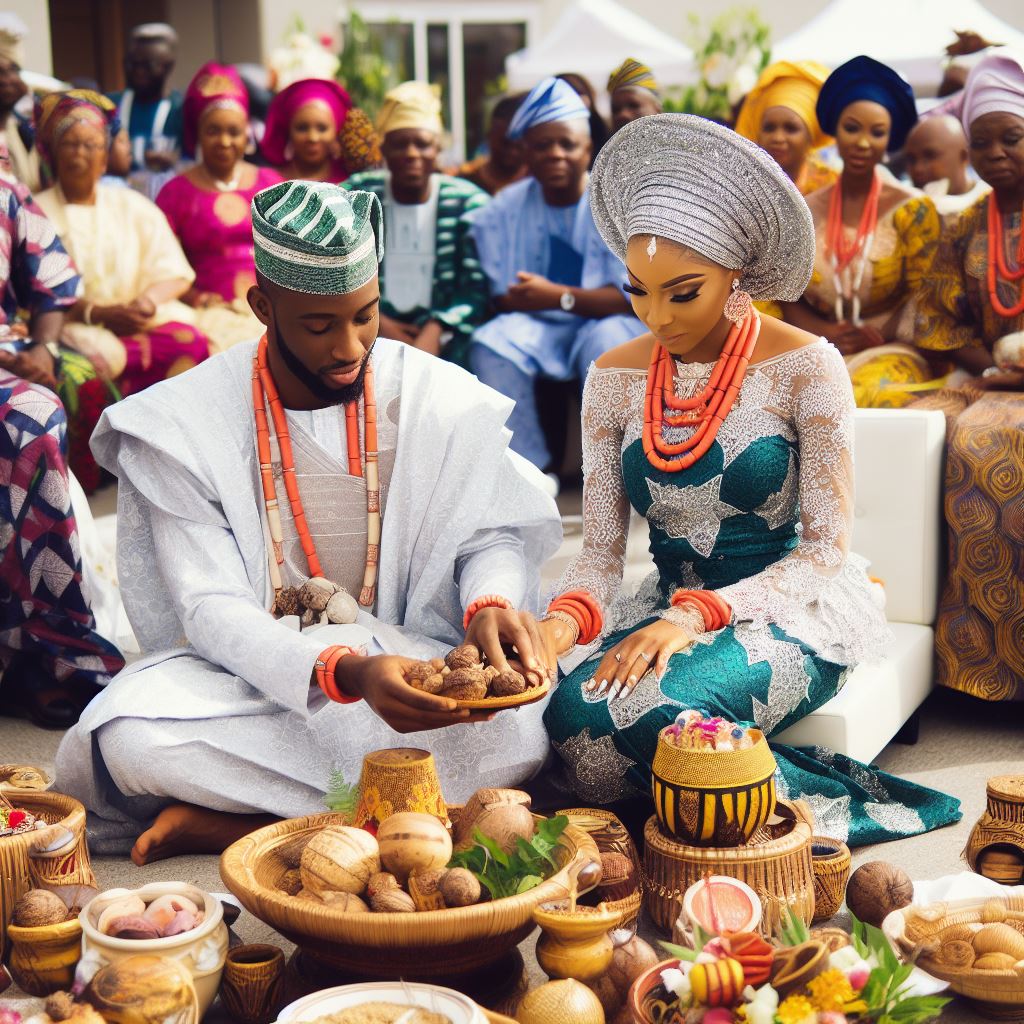Introduction
Marriage certificates in Nigeria hold immense significance, serving as the legal backbone of marital unions. They offer couples both rights and responsibilities, assuring the protection of their union under the law.
A step-by-step guide is essential to navigate the often intricate process of obtaining a marriage certificate. It provides clarity and simplicity for couples who want to ensure their union is legally recognized.
In Nigeria, the legal requirements for obtaining a marriage certificate encompass a range of documents, including birth certificates, affidavits, and evidence of the dissolution of previous marriages.
The process involves formal registration with the appropriate authorities, which can vary depending on the couple’s religious affiliation or cultural background.
This blog section will unravel the complexities of obtaining a marriage certificate in Nigeria.
Breaking down the steps and requirements to ensure that couples can embark on their marital journey with legal confidence and peace of mind.
Preparing for Marriage Registration
Overview of necessary documents and requirements for marriage registration
To begin the process of getting married in Nigeria, certain documents and requirements must be met. These include:
- Birth certificates: Both parties must provide their birth certificates as proof of age.
- Medical certificates: A medical certificate showing that both individuals are fit for marriage is required.
- Evidence of divorce or death of previous spouse (if applicable): If either party was previously married, they must provide legal documentation of the divorce or death of their former spouse.
- Passports or identity cards: Both individuals need to present valid identification documents such as passports or identity cards.
- Four passport-sized photographs: Four recent passport-sized photographs of each party are needed for documentation purposes.
- Marriage declaration form: This form must be completed and signed by both individuals, indicating their intention to marry.
- Sworn affidavit: A sworn affidavit stating that there is no legal impediment to the marriage must be provided.
Explanation of the need for both parties to be at the legal age of marriage
In Nigeria, the legal age of marriage is 18 for both males and females. It is essential for both parties to be at least 18 years old to register their marriage.
This requirement ensures that individuals enter into marriage voluntarily and with the necessary maturity to handle the responsibilities that come with it.
The legal age for marriage aims to prevent child marriages and protect the rights of young individuals who may not be capable of making informed decisions about marriage.
By enforcing this requirement, the government seeks to promote the well-being and development of its citizens.
Importance of obtaining parental consent if either party is underage
Before registering the marriage, if either party is underage, parental consent is necessary to prevent coerced or forced marriages.
Obtaining parental consent ensures that any underage person entering into marriage has the support and approval of their parents or legal guardians.
It acknowledges the significance of family involvement in such life-altering decisions and promotes a sense of responsibility and accountability among all parties involved.
Parental consent safeguards underage individuals’ rights and well-being, considering their best interests before they enter marital unions.
The first step in the process of obtaining a marriage certificate in Nigeria involves preparing for marriage registration by gathering the necessary documents and meeting the requirements.
It is crucial for both parties to be of legal age and, if underage, to obtain parental consent.
Adhering to these guidelines upholds the integrity of the institution of marriage and protects the rights of all individuals involved.
Choosing a Marriage Registry
Selecting the appropriate marriage registry is crucial when marrying in Nigeria. There are different types of registries available, each with its own pros and cons.
In this step, we will discuss the various types of registries and guide you on how to select the appropriate one based on your preferences and circumstances.
1. Federal Registry
The federal government operates the Federal Registry, the most widely recognized registry type in Nigeria.
It is located in the Federal Capital Territory and is responsible for registering marriages across the country.
- Pros: The Federal Registry provides legal recognition throughout Nigeria and is widely accepted.
- Cons: It may require more paperwork and longer processing times due to the high number of applications.
2. State Registry
Each state in Nigeria has its own registry, which is operated by the state government. These registries are responsible for registering marriages within their respective states.
- Pros: State registries offer convenience as they are located within the state, reducing travel time and expenses.
- Cons: The recognition of state registries may sometimes be limited to the particular state where the marriage took place.
3. Religious Registry
In addition to the government registries, religious bodies in Nigeria are authorized to conduct and register marriages. These include the Christian, Islamic, and traditional religious registries.
Strengthen Your Marriage Today
Get personalized solutions for your relationship challenges. Receive expert Marriage Consulting tailored just for you in 1-3 days.
Get Started- Pros: Religious registries often incorporate cultural and traditional practices, providing a personalized wedding experience.
- Cons: The legal recognition of religious registries may vary, and it may be necessary to register the marriage in a government registry as well.
Choosing the Appropriate Registry
Now that you are aware of the different types of registries, it’s time to choose the one that suits your preferences and circumstances. Here are some guidelines to help you make the right decision:
- Consider the legal recognition: If you want your marriage to be legally recognized nationwide, the Federal Registry is the best choice.
- Think about location: If convenience is important to you, opt for a State Registry that is closer to your place of residence.
- Take into account cultural and religious preferences: If you wish to incorporate specific customs and traditions, a Religious Registry may be more suitable.
- Consult with your partner: Discuss your options and come to a mutual decision that meets the needs and desires of both parties.
- Do thorough research: Read reviews, seek recommendations, and gather information about the processes and requirements of each registry.
Choosing the right marriage registry is crucial for a smooth and legally recognized union.
Consider the pros and cons, assess your preferences and circumstances, and make an informed decision that will pave the way for a joyous and memorable wedding ceremony.
Read: Couples of the Bible: Stories and Marriage Verses
Filling the Marriage Notice Form
Accurate completion of the Marriage Notice Form is pivotal in the process. It’s a critical document required to initiate your marriage certificate application.
Required Information
The form demands essential details about both partners, including full names, addresses, occupations, marital statuses, and parents’ names. Ensure precision in every entry.
Supporting Documents
Supporting documents are crucial. Attach clear photocopies of your birth certificates, valid identification (e.g., international passport), and passport-sized photographs.
If either party was previously married, provide proof of divorce or death certificates of the former spouse.
Avoiding Common Mistakes
Mistakes on the form can lead to delays or rejection. Double-check all entries, especially dates and names. Ensure that supporting documents are legible and up-to-date.
Don’t forget to sign the form where necessary. Be truthful and consistent with the information provided. Inconsistencies may raise red flags.
If you’re unsure about any detail, seek guidance from the registrar’s office. They are there to assist in ensuring the form is accurately filled out.
Remember, precision and completeness are your allies in this step. Take the time to carefully complete the Marriage Notice Form.
Being diligent will smooth the application process and improve your chances of obtaining a marriage certificate without complications.
Read: The ‘Married at First Sight’ Phenomenon: Nigeria’s Perspective
Submission and Waiting Period
Submitting the completed marriage notice form is a pivotal step. Here’s what you need to know.
Where and How to Submit
Deliver the form, along with supporting documents, to the marriage registry where you initially filed your application. The registrar’s office is the designated submission point.
Waiting Period and Publication
After submission, a waiting period begins. The marriage notice will be publicly displayed for 21 days. This is a legal requirement.
Words No One Else Can Say, Crafted Just for You
Envision your deepest feelings woven into vows, speeches, or letters uniquely resonating with your love story. We craft personalized expressions no one else can replicate, capturing your emotions in words that touch hearts.
Express YourselfDuring this time, the notice is open for objections or inquiries from the registrar or any member of the public.
What to Expect
Be prepared for possible objections or inquiries. If there are no valid objections or hindrances, the registrar will issue a Certificate of Freedom to Marry, a crucial document for obtaining your marriage certificate.
While waiting, stay in touch with the registrar’s office for updates. Maintain patience and ensure all information is accurate to avoid potential issues during this stage.
Step 4 is all about due process and adhering to legal requirements. Understanding the waiting period and potential inquiries is essential for a smooth journey towards obtaining your marriage certificate.
Read: Commitment and Marriage: Bible Verses to Live By

See Related Content: Marriage Counselling: Success Stories from Abuja
Marriage Ceremony and Registration
Once you have completed all the necessary paperwork and obtained the necessary documents outlined in the previous steps, you are ready to proceed with the marriage ceremony and registration.
This step focuses on the necessary arrangements for the ceremony, the role of witnesses, and the signing and registration process.
Overview of the necessary arrangements for the marriage ceremony
- Choose a wedding venue that suits your preferences and budget.
- Decide on the type of ceremony you want, whether religious or civil.
- Contact a marriage registrar to discuss the date and time of your ceremony.
- Make arrangements for any required documentation the registrar may request.
- Prepare the guest list and decide on the number of attendees for your ceremony.
- Plan the order of events, including the exchange of vows and rings.
- Arrange for any additional services, such as music, decorations, or photography.
- Inform your chosen witnesses about the date, time, and location of the ceremony.
The potential witnesses and their role during the ceremony
In Nigeria, it is customary to have two witnesses present during the marriage ceremony. These witnesses are usually close friends or family members who can attest to the validity of the marriage.
Their role includes:
- Witnessing the exchange of vows between the bride and groom.
- Signing the marriage register to confirm their presence at the ceremony.
- Providing their contact details for the marriage certificate.
- Being present throughout the entire ceremony to validate its legality.
- Supporting the couple and conveying their well-wishes for the marriage.
Explanation of the signing and registration process, including the issuance of the marriage certificate
In the marriage ceremony, the couple and witnesses sign the register under the registrar’s supervision for accurate record-keeping. Couples receive a temporary certificate instantly.
Following the ceremony, the registrar will then proceed with the registration of the marriage. This involves submitting the marriage register to the appropriate marriage registry within 7 days.
The registry will then process the documents and issue the official marriage certificate.
The marriage certificate legally proves your marriage and is essential for changing marital status on official documents or applying for spousal benefits.
Remember, it is crucial to follow the specific guidelines and regulations outlined by your state or local government when it comes to marriage ceremonies and registrations.
Now that you have completed the marriage ceremony and registration, you can enjoy your newly married life and embark on the next section of your journey together.
Read: Strength in Unity: Marriage Verses from Ecclesiastes
Transform Conflicts Together
Imagine turning disagreements into growth opportunities. Our unique worksheets guide you and your partner through challenges, building a stronger bond like no one else can.
Embrace HarmonyPost-Marriage Registration
Once you have successfully registered your marriage and obtained your marriage certificate, it is important to understand the significance of acquiring multiple copies of the certificate.
This step is crucial as it ensures that you have the necessary documentation for various legal and official matters that may arise in the future.
Here are some key points to consider:
1. Importance of Multiple Copies
- It is advisable to obtain multiple copies of your marriage certificate.
- Having extra copies provides a safeguard in case the original gets misplaced or damaged.
- Multiple copies also allow both partners to have their own copy, which can be useful when dealing with separate legal matters.
2. Legal and Official Matters
Your marriage certificate holds great significance in various legal and official matters. It serves as proof of your marital status and can be required in the following situations:
- Claiming spousal benefits from your employer or government agencies.
- Applying for joint loans or mortgages.
- Updating legal documents like passports, driver’s licenses, and social security records.
- Adding your spouse to your health insurance coverage.
- Establishing parental rights and custody in case of children.
- Inheriting assets or property.
Having multiple copies of your marriage certificate ensures you can easily provide the required documents when needed, avoiding delays and complications in these crucial matters.
3. Safekeeping and Certified True Copy
Since your marriage certificate is a vital document, it is essential to keep it safe and secure.
Here are some suggestions to ensure its protection:
- Store the original certificate in a secure place like a safety deposit box or a fireproof home safe.
- Create digital copies and store them on encrypted drives or secure cloud storage.
- Maintain organized physical and digital copies of the certificate, making it easily accessible.
- If necessary, you can obtain a certified true copy of your marriage certificate from the issuing authority.
A certified true copy is a legal duplicate of your original certificate, bearing an official seal and signature of the issuing authority.
The duplicate holds identical legal weight and serves as a suitable substitute when needed.
Obtaining multiple copies of your marriage certificate and ensuring its safekeeping is crucial for various legal and official matters.
Preparedness and organization enable you to handle future situations smoothly and keep essential documents easily accessible.
Conclusion
Recap of the step-by-step guide for obtaining a marriage certificate in Nigeria
Obtaining a marriage certificate in Nigeria requires following the step-by-step guide outlined above.
It is crucial to abide by the legal process to ensure a valid and recognized certificate. By adhering to the necessary steps, couples can legally solidify their union and enjoy the benefits that come with it.
Reiteration of the importance of following the legal process
It is important to remember that each state in Nigeria may have its own specific requirements and procedures regarding marriage certificates.
Highly recommend seeking further assistance or clarification from the appropriate authorities for guidance.
Obtaining a marriage certificate is not only a legal requirement but also an essential document for various purposes, such as inheritance claims, visa applications, and proof of marriage.
Couples can safeguard their rights and ensure international recognition of their marital status by following the correct process and obtaining the certificate.
Marriage is a significant milestone in life, and obtaining a marriage certificate is a crucial step to formalize the union legally.
It provides couples with legal protection, rights, and benefits that contribute to a secure and stable relationship.
We encourage readers who require a marriage certificate in Nigeria to carefully follow the step-by-step guide provided in this blog section.
If you have any questions or need further clarification, do not hesitate to seek assistance from the relevant authorities or legal professionals.
Taking the necessary precautions will help ensure a smooth and successful process in obtaining a marriage certificate in Nigeria.




